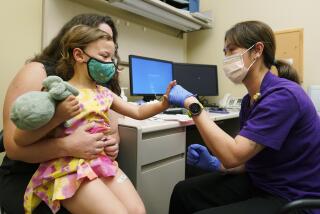What Parents Need to Know
- Share via
Parents and children who are considering whether to participate in clinical drug trials need to ask many questions. Dr. Antonio Arrieta, an infectious diseases specialist and researcher at Children’s Hospital of Orange County, suggests these:
* How long have you been doing this study?
The longer a doctor has been doing the study, the better idea he or she should have of the drug’s safety and effectiveness.
* What is your area of expertise?
Most health officials feel pediatricians and pediatric researchers are best equipped to do research in children. In addition, the researcher should have expertise in the particular area of medicine that is being examined; for example, cancer researchers are best suited to examine cancer drugs.
* Do you do research only in children?
Researchers who work solely with children are more likely to have the greatest expertise in pediatric trials.
* Do you have a local institutional review board?
Most experts feel that local boards are able to keep a closer eye on the research and spot signs of trouble quickly. A remote board may not offer the closest scrutiny.
* Who is on your institutional review board (are there people other than just doctors and researchers)?
The best boards typically represent a range of people beyond doctors and researchers. Having a diverse board is felt to offer better oversight of all the potential medical, legal and ethical issues that might arise.
* Have you ever been audited (a common procedure in which outside authorities check to make sure research is being done properly)?
Audits are not bad; they are simple routine checks by outside authorities to make sure the study is being done correctly. Most research institutions have been audited.
* If you have been audited, how did you do?
Parents should find out if the audit uncovered any problems. Ask to see a copy of the document.
* Will you answer all my questions about the informed consent document before I sign it?
Parents should never feel their concerns are ignored or that they are pressured to give consent. Arrieta adds parents can ask to take the informed consent document to another doctor to get a second opinion.





